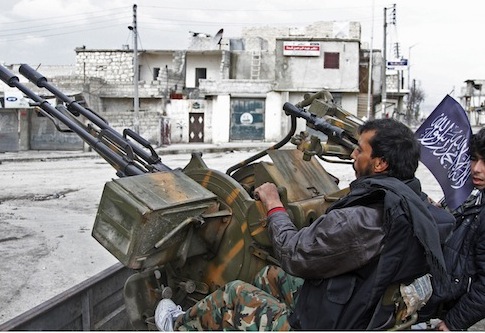Syrian rebels have reportedly bombed two compounds operated by the Lebanese terror organization Hezbollah, the main Syrian opposition group announced Thursday.
The Free Syrian Army (FSA) claims its forces bombed Hezbollah facilities in Lebanon and Syria, a cross-border raid that indicates the rebels’ desire to increase their attacks on allies of Syrian President Bashar al-Assad.
"The development may mark a critical turn in Syria’s two-year war, bearing out fears that the increasingly sectarian conflict would spill over across Syria’s borders," according to the Israel Project (TIP), which first reported on the operation.
Hezbollah reportedly has been preparing for an attack and had placed its forces on "high alert" in recent weeks according to TIP, a pro-Israel media group that spoke to FSA sources who confirmed the attack.
Syrian rebels have increased their rhetoric against Hezbollah, which has backed Assad’s regime.
The FSA claimed in recent days that Hezbollah had fired at its troops and then threatened to shell the terror group’s strongholds in retaliation, according to regional reports.
The FSA’s apparent willingness to strike Hezbollah indicates that a larger proxy war is playing out between the rebels and Assad’s backers, including Iran.
President Barack Obama has refused to intervene in the conflict in any significant military manner.
Middle East experts say Hezbollah is supporting Assad at the behest of its main sponsor Iran.
"For a group [Hezbollah] that has always portrayed itself as standing up for the dispossessed in the face of injustice, downplaying its sectarian and pro-Iranian identities, supporting a brutal Alawite-dominated regime against the predominantly Sunni Syrian, opposition risked shattering a long-cultivated image," said Matthew Levitt, director of the Washington Institute for Near East Policy Stein Program on Counterterrorism and Intelligence.
"In the end, the strategic necessity of preventing the collapse of the Assad regime—which, if replaced by a regime representing the country's Sunni majority, would be far less friendly to Hezbollah and possibly outright opposed to it—took precedence over the need to maintain the party's image," said Levitt.
The cross border violence suggests Hezbollah’s presence in Lebanon could further destabilize the country, Levitt said.
"As these recent events make clear, no party is playing a more destabilizing role in Lebanon over the past few years than Hezbollah," he explained. "Indeed, time and again Hezbollah has made it clear through its own actions that its commitment to Iran and Iranian interests trumps its identity as a Lebanese political movement."
